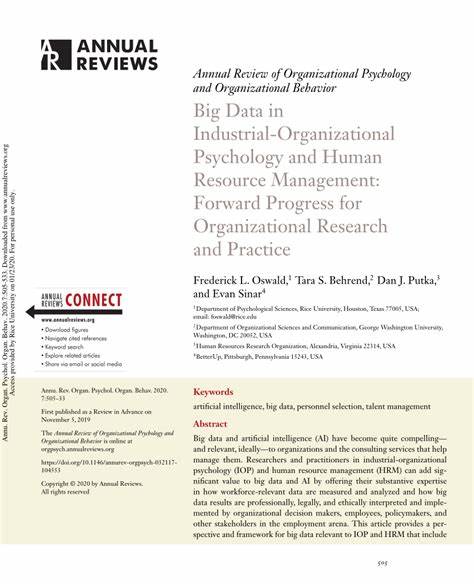Experts and Expertise in Organizations: An Integrative Review on Individual Expertise
IF 14.3
1区 管理学
Q1 MANAGEMENT
Annual Review of Organizational Psychology and Organizational Behavior
Pub Date : 2024-08-01
DOI:10.1146/annurev-orgpsych-020323-012717
引用次数: 0
Abstract
Experts and expertise contribute to consequential organizational decisions from recruitment to CEO succession, but these constructs are inconsistently operationalized and poorly understood. To better explicate how experts and expertise function in organizations, we first conduct an integrative review of the general literature to describe what is known about these phenomena in cognitive science, psychology, and the clinical and technical professions. This review of the general literature indicates that expertise represents domain-specific hierarchical knowledge structures developed by an individual over time. The quality of the individual's domain-related education, training, and opportunities for practice and learning affect the level of expertise acquired. We then review what is known about experts and expertise in organizations. Many organizational studies on expertise focus on an individual's years of experience rather than the nature of that experience or its contribution to expertise. Conflating expertise with years of experience generally leads to less consistent effects on performance than operationalizing expertise in terms of individual cognitive processes, knowledge, and capabilities. Findings from organizational studies that do assess expertise are in line with the general literature, indicating that the quality of practice and learning experiences are particularly important to developing expertise. We then offer ways for scholars to better study how expertise functions in organizations and conclude by developing implications for practice.组织中的专家和专业知识:关于个人专长的综合评论
从招聘到首席执行官继任,专家和专业知识都会对组织的重大决策产生影响,但这些概念的操作性并不一致,人们对它们的理解也不透彻。为了更好地解释专家和专业知识如何在组织中发挥作用,我们首先对一般文献进行了综合回顾,以描述认知科学、心理学以及临床和技术专业对这些现象的了解。对一般文献的综述表明,专业知识代表了个人随着时间的推移而形成的特定领域分层知识结构。个人所接受的与领域相关的教育、培训以及实践和学习机会的质量,会影响其所获得的专业知识水平。然后,我们回顾一下关于组织中的专家和专业知识的已知情况。许多关于专业知识的组织研究关注的是个人的经验年限,而不是经验的性质或对专业知识的贡献。将专业技能与经验年限混为一谈,通常会导致对绩效的影响不如从个人认知过程、知识和能力的角度来操作专业技能那么一致。对专业技能进行评估的组织研究结果与一般文献一致,表明实践和学习经历的质量对专业技能的发展尤为重要。然后,我们为学者们提供了更好地研究专业知识如何在组织中发挥作用的方法,最后提出了对实践的启示。
本文章由计算机程序翻译,如有差异,请以英文原文为准。
求助全文
约1分钟内获得全文
求助全文
来源期刊
CiteScore
24.20
自引率
2.20%
发文量
22
期刊介绍:
Launched in March 2014, the Annual Review of Organizational Psychology and Organizational Behavior is a publication dedicated to reviewing the literature on I/O Psychology and HRM/OB.
In the latest edition of the Journal Citation Report (JCR) in 2023, this journal achieved significant recognition. It ranked among the top 5 journals in two categories and boasted an impressive Impact Factor of 13.7.

 求助内容:
求助内容: 应助结果提醒方式:
应助结果提醒方式:


